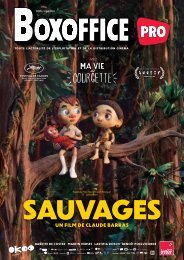You also want an ePaper? Increase the reach of your titles
YUMPU automatically turns print PDFs into web optimized ePapers that Google loves.
ON THE HORIZON<br />
they could, and these Jack Sparrow-ed copies made it that much easier.<br />
Ironically, this also made Dickens the most popular writer in the United<br />
States, which was still struggling to establish its own literary identity.<br />
So how much did Dickens earn from his unmatched popularity in<br />
the United States? Practically nothing. Once the pirated copy landed in<br />
the United States, newspaper publishers would reprint the serials at their<br />
printing houses and then sell them for much cheaper than the legitimate<br />
bound copies. Because there was no international copyright law in the<br />
United States, Dickens had no legal recourse on American soil. So what<br />
did he do? What any good Englishman would do: he went on holiday to<br />
the United States.<br />
On two separate occasions, Dickens visited the United States. The<br />
first was in 1842 at the age of 30. Upon his arrival, Americans greeted<br />
him like Ted Nugent at an NRA rally in Montana. It was a classic American<br />
hero’s welcome for the British writer. Dickens took advantage of this<br />
opportunity to broach the issue of an international copyright law, one of<br />
the main purposes for his visit. It was a case of good intentions, bad idea.<br />
His arguments mostly fell on deaf ears—why pay an American author<br />
when you could steal from a really good British one for free? Some<br />
Americans even turned sour toward Dickens, arguing he’d betrayed their<br />
adulation by demanding compensation for his literary creations. (I know,<br />
what a jackass!) He sailed home bitter and disillusioned about America<br />
and then immediately wrote<br />
two scathing works on his<br />
Upon his<br />
arrival, Americans<br />
greeted [Dickens]<br />
like Ted Nugent at<br />
an NRA rally in<br />
Montana. It was<br />
a classic American<br />
hero’s welcome for the<br />
British writer.<br />
trip entitled American Notes<br />
and Martin Chuzzlewit.<br />
Neither was flattering toward<br />
the United States. Yet<br />
despite an initial negative<br />
reaction, Americans eventually<br />
got over it and began<br />
to love Dickens again. Let’s<br />
face it: the man was great at<br />
what he did. This must have<br />
been why we were so eager<br />
to forgive Mark McGwire.<br />
Dickens, never daunted<br />
by a political challenge,<br />
made a second trip to<br />
America in 1867 even as<br />
he battled numerous health<br />
issues. You’d be sick too if you had to live in London during the mid-<br />
19th century. And once again, he lobbied for an international copyright<br />
law, which, strangely, still hadn’t been passed in 25 years. Gotta love<br />
American politics. But in our defense, we just went through a bloody<br />
Civil War, so our minds were clearly elsewhere. In the end, Dickens<br />
couldn’t muster enough legislative support and traveled back to England<br />
where he died in June of 1870. However, this story does have a happy<br />
Hollywood ending.<br />
The U.S. Congress eventually did something to protect the works<br />
of writers and artists. The International Copyright Act of 1891 (aka the<br />
Chace Act after Sen. Jonathan Chace of Rhode Island) extended protection<br />
to foreign copyright holders from select countries (i.e., countries<br />
that weren’t trying to torpedo our ships). The law was also important<br />
for American creators since they were more likely to have international<br />
copyright protection in countries that were offered the same protection<br />
by the United States. In short, everyone agreed to play nice, and those<br />
in the creative community finally got protection under the law. This<br />
is the ultimate goal of SOPA and PIPA: to allow the U.S. government<br />
to protect the rights of the creative community whose works are being<br />
distributed illegally through foreign-based websites. It doesn’t thwart<br />
creativity—it preserves it. In the end, Charles Dickens’ efforts should<br />
prove prophetic again.<br />
30 BOXOFFICE PRO MAY <strong>2012</strong>

















